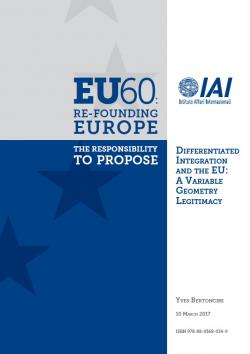Differentiated Integration and the EU: A Variable Geometry Legitimacy
Since the member states and peoples of the EU are “united in diversity”, it seems natural for the European construction to use patterns of differentiated integration, so as to be able to act in an effective manner while taking this diversity into account. However, the promoters of differentiated integration should focus not only on effectiveness, but also on legitimacy issues, which are key for the EU’s functioning and success, at a time when it is confronted by global challenges but also fragmented along several divides between states and peoples. This contribution explores the philosophical, political and institutional conditions which must be met to allow a legitimate deepening of differentiation within the EU, and highlights the importance of a differentiation based on sound political foundations, which is then able to serve the interests of the European peoples, for example as regards collective security issues and the Economic and Monetary Union.
Paper prepared within the context of “EU60: Re-Founding Europe. The Responsibility to Propose”, an initiative launched by the Istituto Affari Internazionali (IAI) and the Italian Ministry of Foreign Affairs and International Cooperation (MAECI), in cooperation with the Centro Studi sul Federalismo (CSF) and in the framework of IAI’s strategic partnership with the Compagnia di San Paolo, on the occasion of the 60th Anniversary of the Treaties of Rome. Published also in French: “L'intégration différenciée dans l'Union européenne: une légitimité à géométrie variable”, in Jacques Delors Institute Policy Papers, No. 186 (10 March 2017).
-
Details
Roma, IAI, March 2017, 16 p. -
ISBN/ISSN/DOI:
978-88-9368-034-9
Introduction
1. Differentiated integration should be perceived as a “second best” option for today’s Europe
1.1 An open and inclusive promotion of differentiation
1.2 The need for several European positive agendas
2. Differentiated integration is legitimate in cases of heterogeneous national wills or capacities
2.1 Differentiation as a result of different political and democratic wills
2.2 Differentiation as a consequence of heterogeneous national capacities
3. Differentiated integration should be implemented through legitimate European procedures and set ups
3.1 EU internal differentiation should be preferred whenever possible
3.2 The challenge of the relations with non-participating EU member states
Conclusion: Some institutional ways forward
References
Topic
Tag
Related content
-
Ricerca19/09/2016
EU60: Re-Founding Europe. The Responsibility to Propose
leggi tutto



